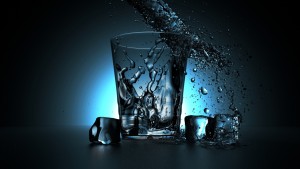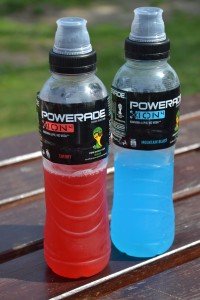Keeping hydrated throughout the day is imperative for our health. Water plays a vital role in every bodily function you use daily, around 60% of your body is made up of water. When we exercise, we lose a lot more water via perspiration (sweat). You can lose up to a litre per hour of fluid whilst you exercise which is mainly through perspiring and breathing. By neglecting to top up these fluids, you can get dehydrated. Dehydration can affect your energy levels, your muscle cells are almost three-quarters water so if you’re short on fluids, you’ll feel the strain. Drinking little and often will give you the best chance of hitting your exercise goals. Being dehydrated can affect both your general health and how well you can exercise, you’ll feel tired more quickly and won’t be able to control your temperature as well. Water helps fuel your muscles, so drinking before, during and after exercise will boost your energy levels, and may help to prevent muscle cramps.
 Before exercising you should aim to start your workout in a hydrated state, failing to begin your workout hydrated, will mean that your body will be playing catch up with your hydration as you will be losing more fluid. Being dehydrated before exercising makes your heart work a lot harder than usual and your core body temperature will rise faster. You should aim to drink 5–7ml per kilogram of body weight before exercise, e.g. 80kg individual: 80 x 5ml = 400ml.
Before exercising you should aim to start your workout in a hydrated state, failing to begin your workout hydrated, will mean that your body will be playing catch up with your hydration as you will be losing more fluid. Being dehydrated before exercising makes your heart work a lot harder than usual and your core body temperature will rise faster. You should aim to drink 5–7ml per kilogram of body weight before exercise, e.g. 80kg individual: 80 x 5ml = 400ml.
During exercise, the amount of fluid that is lost through perspiration is individual to the person, therefore there is no ‘one size fits all’ amount of fluid to drink during exercise. By calculating your individual perspiration rate, using the calculation example below, you will gain a good idea of how much to drink per hour of exercise. Drink periodically during exercise, or when opportunities allow if you are taking part in a timed activity such as a football match. Fluid loss depends on several factors, how much sweat you produce is influenced by:
genetics – some people sweat more than others
weight – heavier people tend to sweat more than lighter people, it is also worth noting that men sweat more than women
fitness – fitter people sweat more and earlier in exercise as their bodies are more accustomed to needing to cool down
environment – you sweat more in hot, humid conditions
exercise intensity – you sweat more as you exercise harder
That bitter taste on your lips during and after exercise is salts, or electrolytes, which must be replaced. Electrolytes allow our bodies to optimise our ability to absorb the water we drink, and they are also important for muscle and organ function. These salts also keep us thirsty, reminding us to keep our fluid intake up, and as a result stay hydrated.
For any athlete, minimizing your fluid loss to not more than 2% of your body weight is a good rule. At that 2% body loss, you’ll start to see increased fatigue, reduced endurance, the beginnings of heat illness and declining motivation. The good news is that rehydrating will reverse all these problems. The longer your workout or competition lasts, the more dehydration will hurt your performance. A review of scientific studies showed that endurance athletes like triathletes and marathon runners had a performance drop of 7% to 60% when dehydrated. Athletes requiring muscle strength, like bodybuilders, saw their power reduced when their sweat loss was as low as 3% of their body weight.
After exercising, it is important to replenish your hydration needs by drinking 100% of the fluid lost through sweating during exercise, use the fluid replacement calculation below to help determine how much you should drink. If you performed for a particularly long duration of exercise in warmer conditions consume up to 150% of the fluid lost. Electrolytes lost during exercise can be replenished by consuming non-fluid sources such as salty snacks or a healthy meal.
Sweat loss:
Weigh yourself before and after exercise
Subtract you post-exercise body weight in kilograms (kg) from your pre-exercise weight
Convert kg to grams (g) 1kg is equal to 1000g
Add the amount of fluid in milligrams ingested during exercise, to the grams of sweat lost
For example: If an individual was 82kg before training, 80kg post training, and drank 500ml water during exercise their sweat loss would be:
82kg – 80kg = 2kg lost
2 x 1000 = 2000g
2000g + 500ml = 2500g
Fluid replacement:
Convert the amount of sweat lost (g), to the amount of fluid you need to drink to rehydrate(ml) (1000g of weight = 1000 ml of sweat)
Drink 100 -150% of what was lost. If exercise intensity was high and sweat loss was substantial, 150% replenishment would be adequate, if not, 100 % would be sufficient.
The same individual needs to drink the following to hydrate:
2500g = 2500ml
2500 X 1.5 = 3750ml
Therefore, the consumption of an upper requirement of nearly 4 litres of water (if they were partaking in high intensity, long duration exercise in the heat), would be necessary post exercise to replenish hydration status.
Sports Drinks:
The vast array of sports drinks on the market can be overwhelming, so what should we be drinking?
 Water doesn’t always have to be the drink of choice for fluid replacement. Many drinks including milk and fruit juices count towards your fluid intake requirements, and they also provide the bonus of being a source of essential nutrients and calories. If you’re exercising for less than an hour, water is all you need to keep hydrated. If you’re exercising for longer than an hour, sports drinks or even fruit squash can help you keep going for longer. As well as replacing lost fluid, they contain carbohydrates (sugar) and electrolytes. Electrolytes are the substances (sodium, potassium, magnesium and chloride) that salts break down into when they dissolve in fluid. These drinks provide fuel and help to keep you hydrated. Drink them after you start exercising rather than before because it’s only when you start perspiring that you will lose electrolytes and need energy.
Water doesn’t always have to be the drink of choice for fluid replacement. Many drinks including milk and fruit juices count towards your fluid intake requirements, and they also provide the bonus of being a source of essential nutrients and calories. If you’re exercising for less than an hour, water is all you need to keep hydrated. If you’re exercising for longer than an hour, sports drinks or even fruit squash can help you keep going for longer. As well as replacing lost fluid, they contain carbohydrates (sugar) and electrolytes. Electrolytes are the substances (sodium, potassium, magnesium and chloride) that salts break down into when they dissolve in fluid. These drinks provide fuel and help to keep you hydrated. Drink them after you start exercising rather than before because it’s only when you start perspiring that you will lose electrolytes and need energy.
Contrary to popular belief, although large amounts of caffeinated drinks such as tea, coffee and caffeinated are considered diuretics, meaning they increase urinary output, a moderate intake (around 4 cups per day) of these drinks can be used to replenish fluid losses. Try to limit the amount of sugar you add to your tea or coffee and choose low sugar drinks as oral health can be compromised with too much sugar.
When choosing a sports drink, there are 3 types you will need to consider. These are hypotonic, isotonic and hypertonic sports drinks.
A hypotonic drink is low in carbohydrates (less than 4g per 100ml) and is designed to replace the fluids you lose during exercise.
Isotonic drinks contain a moderate amount of carbohydrates (4 to 8g per 100ml). As well as helping to replace fluid, they will also go some way towards topping up your body’s carbohydrate stores. Carbohydrate levels can sometimes get low if you exercise for more than an hour.
Hypertonic fluids have a high concentration of carbohydrate (8g or more per 100ml). Your body absorbs them more slowly than plain water, but it will give you a boost with refuelling.
If you are running long distances, energy gels can be helpful to replace carbohydrates used by your body. Gels are thick syrups that are intended to be washed down with a small amount of water.
Gels vs Sports Drinks:
Gels are much more energy-dense than sports drinks, this in turn makes it a lot more manageable to hit high levels of carbohydrate intake during a marathon or other long-distance events
Always take energy gels with water, never alone and never with a high sugar sports drink. Without water, energy gels will take longer to digest and enter the blood stream. If you take an energy gel with a sports drink, you run the risk of ingesting too much simple sugar at once. Taken together, a gel and sports drink could be delivering close to 60g of pure sugar!
Gels are packaged in small foil pouches, which makes them easy to carry, either in training or in a race
The only drawbacks to sports gels are that they can be hard to stomach while running and they tend to be expensive. It’s important that you experiment with trial and error to determine which gel is best for you. Some brands are more viscous, some taste better, what works for you may not for another runner. The important thing is that you experiment and find something that suits you
Unfortunately, gels on the market today seem to be even more jam-packed with additives like amino acids, protein, vitamins, and other supplements. These certainly drive up the cost, but don’t do add any benefit, at least as far as fuelling is concerned
As an alternative, you could try plain honey—honey has just about the right ratio of glucose and fructose for maximum carb absorption, and is additive free.
It is important to note that too much hydration in sport can lead to adverse effects. It has been shown that excessive consumption of non-salty fluids, well beyond your individual requirements, can cause serious health implications by diluting your natural salt levels, this is commonly found in amateur marathon runners. The best way to avoid dehydration or over hydrating is to drink little and often through the day and to replace fluids lost during exercise appropriately.
Drinking too much can potentially be harmful as it can cause a rare condition called hyponatraemia. This is when you drink more fluid than you lose. The excess water dilutes the salts in your body and your cells swell up, which can cause several problems. The amount you must drink to get hyponatraemia varies hugely from person to person. The symptoms include:
- feeling confused or disorientated
- a headache
- feeling sick
- vomiting
- muscle cramps
In a worst-case scenario, severe hyponatraemia can lead to a coma, seizures (fits) and even death. But you would have to drink well over your requirements for it to develop. It’s sensible to be aware of the risks but don’t let this put you off drinking completely.
Hydration Top Tips:
- It takes time for fluids to be absorbed into your body.
- Drink steadily during the day and aim to drink around 500ml of fluid at least four hours before you exercise
- In the 10 to 15 minutes before you exercise, top your fluid levels by drinking about half of this again
- Make sure you always have a bottle of water handy when you exercise so you don’t get dehydrated
- Don’t be tempted to reward yourself after exercise with a trip to the pub or a glass of wine in front of the TV, alcohol is a diuretic, which means it removes water from your body by increasing how much urine your kidneys produce
- Chill your drinks, studies have shown that people drink more if their drinks are cooled, therefore replacing more of the fluid that has been lost during exercise
- Taste, choose to rehydrate with drinks you enjoy drinking. You are far more likely to drink more, and therefore recover quicker, if you like what you are drinking
Should you require any further information or would like specialist advice from our performance nutritionist please call 0191 2330500 or complete the contact form here.

